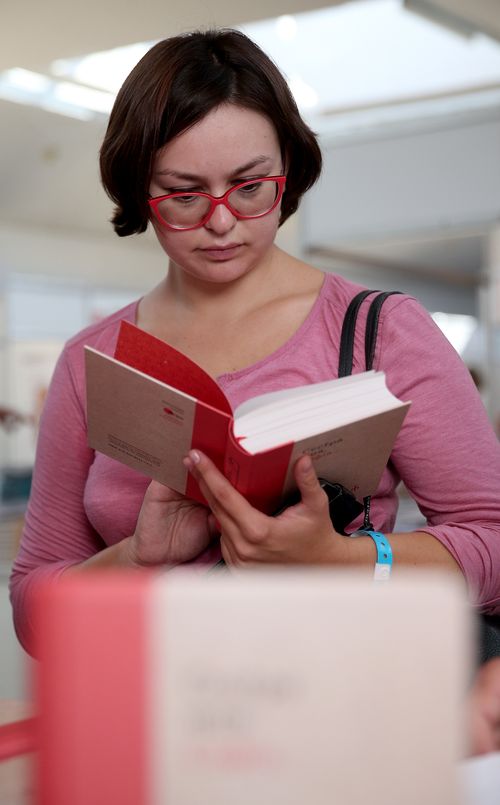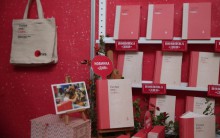Although Den’s new book My Sister Sofia… was launched only two weeks ago at the Lviv Forum of Publishers, it has already received an invitation from Izmail, a place with the largest Bulgarian community in Odesa oblast. The presentation will be held on September 30 at 12 a.m. at the conference hall of Izmail State Liberal Arts University. By request of Den’s editor-in-chief, the book will be presented by its compiler Ihor Siundiukov, editor of the newspaper’s history section, and Doctor of History Volodymyr Rychka, the author of an article. The event – the first number on the Danube Sich festival program – will be moderated by Mykola Hrytsenko, president of the Charitable Foundation in Support of the Newspaper Den’s Initiatives.
“Our university is the only state-run higher educational institution in the south of Odesa oblast,” says Yaroslav KUCHUK, Rector of Izmail State Liberal Arts University. “As Izmail is considered to be the unofficial capital of the Ukrainian Danube Region, our university not only performs the function of professional higher-education training but is also a scientific and cultural center of this region. We always hold various presentations and exhibits. We are in fact a real center of pro-Ukrainian policies in our region. Our ‘creative studio’ also includes volunteers and public activists. We are interested in spreading more cultural and educational information. For example, our university has just opened the exhibit ‘UPA: Histories of the Unsubdued.’ Although this is a very controversial point in the region, we must know the truth.”

Photo by Ruslan KANIUKA, The Day
Speaking of the necessity to present Den’s “hot” novelty in no other place but Izmail, Mr. Kuchuk says: “About 10 percent of our residents identify themselves as Bulgarians. Izmail has the largest number of ethno-cultural Bulgarian associations – so it is a powerful community. And these associations are pro-Ukrainian-minded. We have invited representatives of the authorities, civil society, Bulgarian and other ethno-cultural organizations. I hope there will be a lively discussion. We also expect guests from Bulgaria. It is very important to us because it is the first book on Ukrainian-Bulgarian historical ties. You can count on our support under any circumstances.” It will be recalled that My Sister Sofia… focuses on historical parallels in the development of the Ukrainian and Bulgarian nations from the times of the first Bulgarian state and Kyivan Rus’ to the early 21st century, when Bulgaria joined NATO and the EU.
Halyna DOIKOVA, director of the Central Kotliarevsky Library, also confirms that Izmail badly needs Den’s books. Last year, thanks to partners of the Den’s Charitable Foundation, the library and its branches received some Den’s Library book sets. “These books are ‘live,’ and people take interest in and read them,” Ms. Doikova says. “Likewise, the newspaper furnishes us daily with very important information.”
“THIS BOOK WILL BECOME A TURNING POINT FOR MANY”
Roman YATSIV, professor of art history, vice-rector of the Lviv National Academy of Arts:
“In my understanding, the concept of this book comes as an undoubtedly great surprise even for experts – historians and researchers of culture. The problematic relations between Rus’-Ukraine and Bulgaria have previously been reviewed only in terms of individual episodes of political or cultural history. In my opinion, this is the first attempt to present these aspects in their historical dynamics and on an extensive factual background.
“The important assistance in finding the perfect angle to illustrate the historical moments shared by Ukraine and Bulgaria has been provided by the acute modern historical situation, as we see the destruction of the flimsy false constructions regarding Moscow’s alleged crucial role in spreading education and culture on the vast territories of baptized Rus’. Obviously, it was necessary to change the perspective on numerous historical facts, which were previously hidden altogether or highlighted in Moscow’s typical paradigm of hypocrisy.
“Having contemplated over the problematic issues raised in the book Return to Tsarhorod, Ukrainian readers get a chance to quickly rebuild the strategy of their historical thinking, discovering a fundamentally new quality of knowledge about the genealogy of Ukrainians within the complex cultural and civilizational contacts with other historical subjects. The book My Sister Sofia... reminds us that we must be more responsible about our own intellectual inquiries. For many, this book will become a turning point in their quest for values and ideology. It is by such fundamental publishing projects we can incite a real long-term change within the system of national education in our common European home.
“Actually I want to say that Den is very good at building modern vision of the world and Ukraine by its projects. Larysa Ivshyna invites the younger generation and finds the balance in our understanding and views on Ukraine, on the essence of historical events. The editors manage to find the key points where a productive resistance can be applied; and I find my own special delight in the recent years in discovering the philosophy behind Den’s publications.”
“BULGARIA SOUNDED ANEW TO ME”
Sofia STARYTSKA, pharmacist, Lviv:
“More and more, Den expands Ukraine’s horizon of knowledge, showing examples of how a country at a difficult historical juncture can withstand and continue, get rid of the old yoke and become a European state. So, the book My Sister Sofia... shows the directions for development we have to understand and adhere to. In Andrii Liubka’s very precise words, one of the preconditions for Bulgaria’s liberation was that the Bulgarians realized: it is not external circumstances that caused their troubles, that reason had been themselves, and they could only rely on themselves. This, in my opinion, should be a roadmap for Ukraine.
“I admit that Bulgaria sounded anew to me, because previously I had a distorted view of this country, based on stereotypes. And it helped me understand: it often happens that a country is perceived wrong because of antiquated judgments. Studying Bulgarian history enables deeper knowledge and understanding of the need to resist the propaganda by means of a morally justified position and personal self-improvement.
“The book My Sister Sofia... has become a pleasant surprise for me, just as every book of Den’s Library. Like in previous projects, the editorial team has performed an admirable work for this book.”
“THE PARALLEL REFERENCES ALLOW US TO BUILD OUR OWN STRATEGY FOR THE FUTURE”
Taras BUKRIEIEV, historian, Kherson:
“When My Sister Sofia... was announced, I became immediately interested in this book. It is unusual to have Den pay so much attention to the history of another country. As a historian, I know that Ukraine and Bulgaria have much in common in terms of historical progress. As I got my hands on the book and had the opportunity to get acquainted with the contents and the preface, I realized immediately that it would give me hours of interesting and useful leisure. But I would have never imagined that our countries had so many historical ties in common.
‘The book My Sister Sofia... is a great opportunity for Ukrainians to discover and learn Bulgaria. The novelty of Den’s Library provides answers for many questions on the history and the present day of Ukraine through the prism of studying the formation of the Bulgarian state. The parallel references in My Sister Sofia... allow us not only to learn more about our country, but also to build our own strategy for the future on the experience of a close neighbor, paving our own way to free Europe.
“Such a book can help Ukrainians get to know EU countries that at one time had made an effort to gain statehood, and went the path to the united Europe. Den’s new book provides an interesting example of a country that had long been dependent on Moscow, but was able to free itself from the restraints of the Russian World.
“It contains articles by very strong researchers, especially historians, philosophers, and philologists. And the text is presented in a way that would be valuable not only for professionals, but for ordinary readers as well. Given that the articles cover the entire period of history from the times of Bulgarian origin to the present, the book can be considered a very strong popular scientific publication on the history of Bulgaria. I believe this is the first comprehensive exploration of Bulgarian history and the relationship between our countries, published in Ukraine.
“The first two chapters are interesting in the context of acquaintance with the origins of the Bulgarian state, of the unique culture and the first historical ‘intersections’ between the two brotherly countries. The third chapter features interesting articles by Petro Kraliuk ‘Impact of the old Bulgarian culture on the culture of Kyivan Rus’,’ and by Yuliana Lavrysh ‘Spiritual autocephaly: why Bulgaria succeeded? The experience of Bulgarian Orthodox Church in the context of Ukrainian autocephalous struggles.’ There are interesting articles in the fourth section as well, namely by Iryna Etkina on Bulgaria between the two world wars and by Borys Sokolov ‘Bulgaria in World War II, the two dictatorships’ – in the context of parallel references with the history of the two countries in the 20th century. I also found some value in the chronological table at the end of the book, which presents the most important dates in the history of Bulgaria in the context of Ukrainian history.”
“I advise this book to everyone who wants to know Bulgaria for themselves and understand the problems of unknown Ukrainian history through the parallel references with the history of a brotherly Balkan country.
“And finally, it’s a pity that our government does little to build such cultural bridges with countries that are historically close and friendly towards us. Unfortunately, presenting the real picture of modern Ukraine, first of all in the countries of the Orthodox world (including Bulgaria), is not among the priorities of the Ukrainian government and the elites. In this context, I would like to see Den’s publishing initiative supported by intellectuals, particularly journalists. Our media often overlook the good initiatives from colleagues, notice only what belongs to them. But projects such as this one, as Den’s experience shows, are shedding light upon the dark spots of Ukrainian history: both in the eyes of Ukrainians and in terms of worldwide knowledge about Ukraine. This is essential for us today. So once again thank you, Den newspaper, for your intellectual innovations you present every year, and I wish your future projects to keep up the high level you already achieved.”







